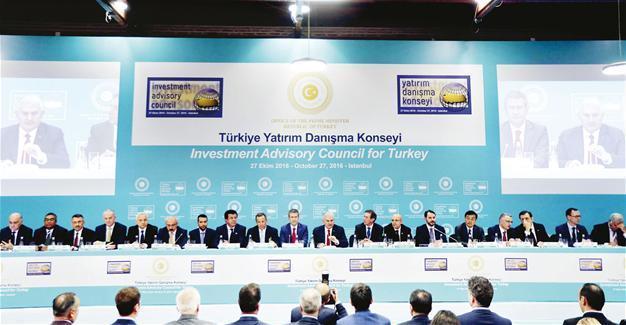Int’l investors praise Turkish economy, voice recommendations after key meeting with gov’t
ISTANBUL - Güneş Kömürcüler

Top representatives from 20 global companies have praised the Turkish economy’s investment climate following the failed July 15 coup attempt, while also voicing recommendations on improving stability and educational quality, carrying out structural reforms, and prioritizing technology at the 9th Investment Advisory Council Meeting in Istanbul.
“The recent unfortunate incidents that have taken place in Turkey with the attempted coup make these achievements more praiseworthy since they show the commitment and success of policymakers to maintain competitive business climate, and the alignment and the unity of people in Turkey to move on their chosen track. As representatives of international business community with strong interest in the potential and future of Turkish economy, we are glad to see this solidarity and strength of Turkey’s stance as a proponent of liberal and dynamic investment policies in the G-20 and sustained growth performance are solid anchors to have positive expectations about appealing opportunities,” said David P. Hess, executive vice president and chief customer officer aerospace for the United Technologies Corporation, reading a declaration on behalf of the companies at a news conference.
They also underlined that there was a “significant gap between the reality and perception” in Turkey as a safe and attractive investment destination at a follow-up press meeting late on Oct. 27.
“We advise the government to make a more efficient use of communication channels with all segments of the international business community. We are committed to working with the government to overcome this gap in perception,” said investors.
The enactment of the law on protection of personal data, the opening of regional courts of justice and administrative courts to facilitate judicial processes, government support for research and development activities, the successful launch of 4.5G technology to accelerate ICT growth, the enactment of a comprehensive reform package on improving the investment climate, the introduction of a new investment incentive scheme for priority regions to narrow regional gaps, and steps to improve jobs markets are among key recent accomplishments by the Turkish government, the representatives stated.
They also particularly referred to Turkey’s growth rates in recent years, which outperformed emerging economies, excluding China and India.
Female, youth participation in labor market ‘key’Hess quoted World Bank Vice President Cyril Muller as saying that Turkey has an opportunity to “get rich before it gets old,” but only if it creates jobs fast enough to accommodate more young people and women entering the workforce, and if those youths and women are sufficiently well-educated to succeed in those jobs.
“Turkey’s key challenge, now that most labor has moved out of agriculture, is to improve productivity growth in manufacturing and services, and that this requires boosting technology, innovation and experimentation,” said Muller, as quoted by Hess.
“Muller also stressed the importance of accelerating institutional reforms so that the rule of law and arms-length market regulation become firmly established: This will help Turkey to build on its many strengths and find a path to higher income,” he added.
“We are here advise the government on prioritizing the maintaining of a stable macroeconomic environment to provide better predictability for investors, carrying forward the structural reform agenda, prioritizing the development of ICT as a strategic sector, elevating innovation through new generation of technology, and improving the quality of education in the period ahead until the next meeting,” Hess said.
They also reportedly recommended that the government merge electronic trade with conventional trade flows, to increase participation of women, youth and disadvantaged groups in the labor force, to boost infrastructure, to use analytical approaches to focus on industries with comparative advantages, and to boost infrastructure.
 Top representatives from 20 global companies have praised the Turkish economy’s investment climate following the failed July 15 coup attempt, while also voicing recommendations on improving stability and educational quality, carrying out structural reforms, and prioritizing technology at the 9th Investment Advisory Council Meeting in Istanbul.
Top representatives from 20 global companies have praised the Turkish economy’s investment climate following the failed July 15 coup attempt, while also voicing recommendations on improving stability and educational quality, carrying out structural reforms, and prioritizing technology at the 9th Investment Advisory Council Meeting in Istanbul.